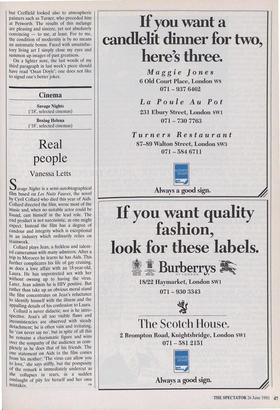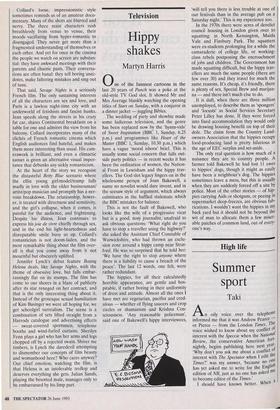Cinema
Savage Nights (`18', selected cinemas) Boxing Helena (`18', selected cinemas)
Real people
Vanessa Letts
Savage Nights is a semi-autobiographical film based on Les Nails Fauves, the novel by Cyril Collard who died this year of Aids. Collard directed the film, wrote most of the music and, when no suitable actor could be found, cast himself in the lead role. The end product is not narcissistic, as one might expect. Instead the film has a degree of candour and integrity which is exceptional in an industry which ordinarily relies on teamwork.
Collard plays Jean, a feckless and talent- ed cameraman with many admirers. After a trip to Morocco he learns he has Aids. This further complicates his life of gay cruising, as does a love affair with an 18-year-old, Laura. He has unprotected sex with her without owning up to having the virus. Later, Jean admits he is HIV positive. But rather than take up an obvious moral stand the film concentrates on Jean's reluctance to identify himself with the illness and the appalling details of his confession to Laura. Collard is never didactic; nor is he intro- spective. Jean's all too visible flaws and inconsistencies are observed with steady detachment; he is often vain and irritating, he 'can never say no', but in spite of all this he remains a charismatic figure and wins over the sympathy of the audience as com- pletely as he does that of his friends. The one statement on Aids in the film comes from his mother: 'The virus can allow you to love,' she says stiffly, but the pomposity of the remark is immediately undercut as she collapses in tears, in a sudden onslaught of pity for herself and her own
mistakes. . .4 .
Collard's loose, impressionistic style sometimes reminds us of an amateur docu- mentary. Many of the shots are blurred and nervy. The three main characters rush breathlessly from venue to venue, their moods vacillating from hyper-romantic to disengaged. They never get more than a fragmented understanding of themselves or each other. And yet for once in the cinema the people we watch on screen are substan- tial: they have awkward meetings with their parents and chaotic pasts. Their conversa- tions are often banal: they tell boring anec- dotes, make faltering mistakes and sing out of tune.
That said, Savage Nights is a seriously French film. The only sustaining interests of all the characters are sex and love, and Paris is a lawless night-time city with an underworld of fetishists and fascist hunks. Jean speeds along the streets in his crazy fat car, shares Continental breakfasts on a table for one and admires the view from his balcony. Collard incorporates many of the clichés of French romantic cinema which English audiences find hateful, and makes them more interesting than usual. His cam- erawork is brilliant, and even a climactic sunset is given an alternative visual impor- tance that debunks any sickly romanticism.
At the heart of the story we recognise the distasteful Betty Blue scenario where the elfin young girl/model/tramp falls madly in love with the older businessman/ artist/pop musician and promptly has a ner- vous breakdown. The relationship, howev- er, is treated with directness and sensitivity, and the girl's collapse, when it comes, is painful for the audience, and frightening. Despite his illness, Jean continues to express his joie de vivre chiefly through sex, and in the end his light-heartedness and disreputable smile buoy us up. Collard's romanticism is not doom-laden, and the most remarkable thing about the film over- all is that you come away from it not mournful but obscurely uplifted.
Jennifer Lynch's debut feature Boxing Helena deals, like Savage Nights, with the theme of obsessive love, but falls embar- rassingly flat on its stumps. The film has come to our shores in a blaze of publicity after its star reneged on her contract, and that is the only interesting thing about it. Instead of the grotesque sexual humiliation of Kim Basinger we were all hoping for, we get schoolgirl surrealism. The scene is a combination of sets lifted straight from a Harrods catalogue and advertising effects — sweat-covered sportsmen, telephone booths and wind-furled curtains. Sherilyn Fenn plays a girl who has her arms and legs chopped off by a rejected swain. Shiver me timbers, is Lynch the daredevil attempting to dismember our concepts of film beauty and womanhood here? Who cares anyway? Our chief emotion, watching the film, is that Helena is an intolerable trollop and deserves everything she gets. Julian Sands, playing the besotted male, manages only to be embarrassed by his limp part.



























































 Previous page
Previous page